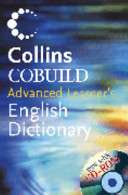Collins COBUILD Advanced Dictionary
The Collins COBUILD Advanced Dictionary[1] (CCAD) from HarperCollins, first published in 1987[2] is a dictionary that distinguished itself by providing definitions in full sentences rather than excerpted phrases. Example sentences are given for almost every meaning of every word, drawn from a large corpus of actual usage.
 | |
| ISBN | 0-00-715799-1 |
|---|---|
Except for the 6th edition, it included phonetic transcriptions based on the International Phonetic Alphabet (IPA). In some editions, a digital version on CD-ROM was included with the dictionary in book form.
The CCAD seems to skimp on American English, but there is its equivalent titled Collins COBUILD Advanced Dictionary of American English.
Editions
- First edition published in 1987 as Collins COBUILD English Language Dictionary
- Second edition published in 1995 as Collins COBUILD Learner's Dictionary
- Third published in 2001 as Collins COBUILD English Dictionary for Advanced Learners
- Fourth published in 2003 as Collins COBUILD Advanced Learner's English Dictionary
- Fifth published in 2006
- Sixth edition published in 2008 as Collins COBUILD Advanced Dictionary (CCAD)
- Seventh edition published in 2012 as Collins COBUILD Advanced Dictionary of English
- Eighth edition published in 2014 as Collins COBUILD Advanced Learner's Dictionary
- Ninth edition published in 2018[3]
Notes
- Szynalski, Tomasz P. (1987). "Review of the Collins COBUILD Advanced Learner's English Dictionary". Antimoon.com. Retrieved 1 February 2011.
-
"Welcome to the Collins English Language Teaching Blog". collinselt.com. Collins. Retrieved 15 February 2017.
When the first COBUILD dictionary was published in 1987 ...
- "COBUILD 30th ANNIVERSARY". collinsdictionary.com. 12 March 2018. Retrieved 20 May 2020.
gollark: I would prefer something more lightweight anyway for battery life.
gollark: The tweet was asking about RTOSes.
gollark: <@540815739884404736> I don't think it'll run Linux.
gollark: Probably, but not if the display can't update fast enough.
gollark: I like overly precise times.
External links
This article is issued from Wikipedia. The text is licensed under Creative Commons - Attribution - Sharealike. Additional terms may apply for the media files.